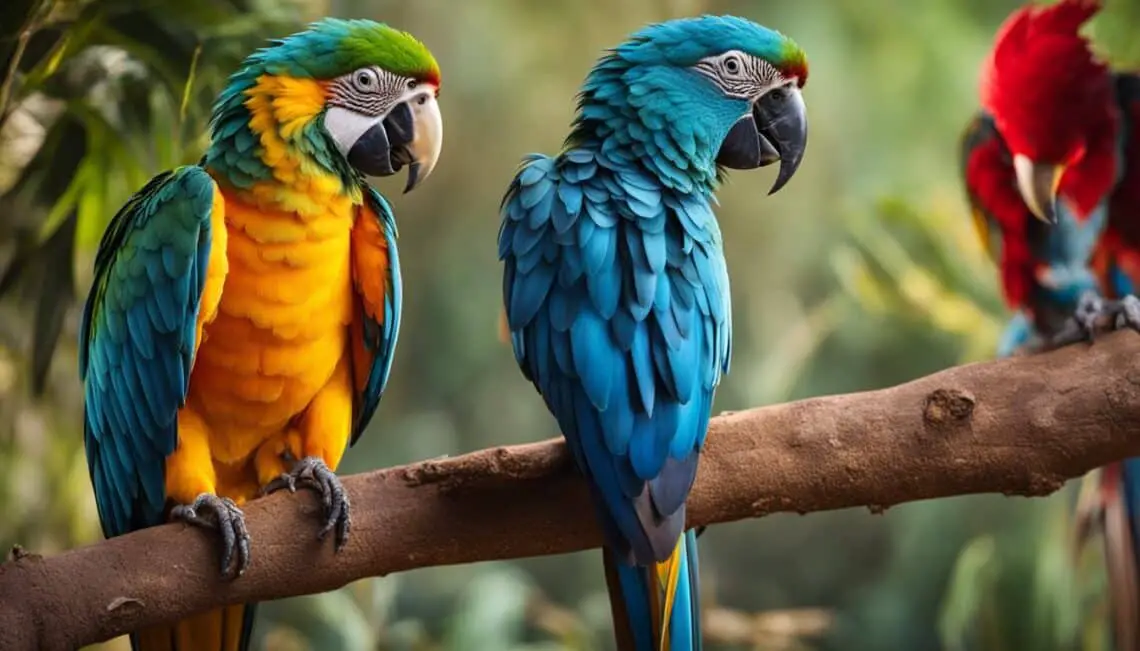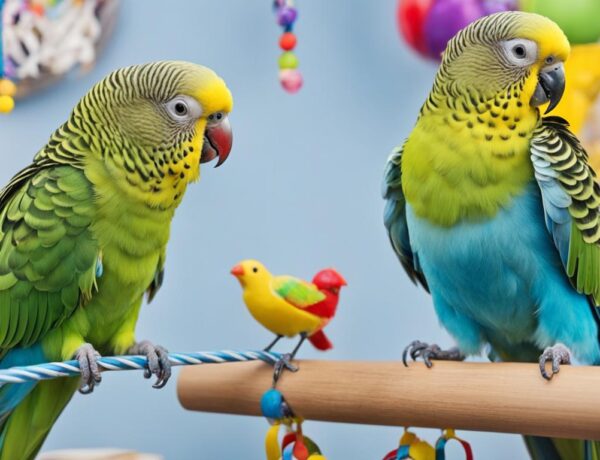As a first-time bird owner, managing challenging bird behaviors can be overwhelming. Birds can exhibit behaviors such as screaming, biting, aggression, and feather plucking, which can test your patience. However, by implementing a comprehensive approach to behavior management, you can create a harmonious bond with your feathered friend.
Preventative health care is essential for addressing challenging behaviors. Regular check-ups with an avian veterinarian can ensure your bird’s physical well-being and detect any underlying health issues. Providing a specialized diet that includes premium bird pellets and fresh, uncooked plant-based foods is also crucial for optimal nutrition.
Environmental enrichment is another important aspect of behavior management. Birds are intelligent and social creatures that thrive on mental and physical stimulation. Providing a stimulating environment with toys, perches, and social interaction can prevent boredom and destructive behaviors.
Behavioral training is a valuable tool for addressing challenging behaviors. Reward-based training methods can teach your bird acceptable behavior while discouraging negative actions. Understanding the underlying causes of the behaviors, such as fear, anxiety, or boredom, can guide your interventions.
Key Takeaways:
- Regular check-ups with an avian veterinarian are crucial for your bird’s health.
- A balanced diet that includes premium bird pellets and fresh, uncooked plant-based foods is essential.
- Providing a stimulating environment with toys and social interaction helps prevent boredom and destructive behaviors.
- Reward-based training methods can shape desired behaviors and discourage negative actions.
- Understanding the underlying causes of challenging behaviors is important for effective intervention.
What Causes Challenging Bird Behavior?
Challenging bird behavior can stem from a variety of causes. Understanding these causes is crucial for maintaining the well-being of our feathered friends. Birds have specialized care needs and can experience anxiety, boredom, loneliness, or physical discomfort if their needs are not met. It is important to recognize that birds are intelligent and social creatures, and their behaviors are influenced by their natural instincts and social dynamics.
If a bird feels anxious or unsafe, it may exhibit behaviors such as excessive screaming, feather plucking, or aggression. Boredom and loneliness can result in destructive behavior and self-harming activities. Birds also experience pain, just like any other living being, and this can manifest in their behavior.
By understanding a bird’s unique characteristics, we can provide the proper care and attention they require. Meeting their social needs through regular interaction, providing mental stimulation through toys and environmental enrichment, and addressing any potential sources of stress are essential aspects of bird care. Ensuring a safe and comfortable environment, along with a balanced diet and regular exercise, can contribute to a bird’s overall well-being and help prevent or alleviate challenging behaviors.
“Birds are highly sensitive animals that require a nurturing and enriched environment to thrive.”
Addressing challenging bird behavior requires a holistic approach that considers the bird’s physical and emotional needs. It is important to consult with avian veterinarians or behaviorists who can provide specific guidance and recommendations tailored to your bird’s unique characteristics.
Common Causes of Challenging Bird Behavior:
- Anxiety
- Boredom
- Loneliness
- Pain or Discomfort
| Cause | Description |
|---|---|
| Anxiety | Feelings of unease, fear, or stress that can be triggered by various factors such as changes in environment or routine. |
| Boredom | Lack of mental or physical stimulation, leading to restlessness or engaging in destructive behaviors. |
| Loneliness | Feeling isolated or deprived of social interaction, which can lead to attention-seeking or self-harming behaviors. |
| Pain or Discomfort | Physical discomfort or illness, causing a bird to exhibit abnormal behaviors as a result of their discomfort. |
Tips for Preventative Health Care
Preventative health care plays a vital role in promoting the overall well-being of your bird. By taking proactive measures and adopting a comprehensive wellness routine, you can ensure that your feathered friend stays healthy and happy. Here are some essential tips for preventative health care:
Regular Check-ups with an Avian Veterinarian
Just like humans, birds also require regular check-ups to identify and treat any potential health issues early on. Consult with a qualified avian veterinarian to schedule routine examinations for your bird. These check-ups allow the vet to assess your bird’s general health, provide necessary vaccinations, and detect any underlying conditions.
A Specialized Diet for Proper Nutrition
Proper nutrition is key to your bird’s health and vitality. Ensure that your bird’s diet consists of high-quality bird pellets, fresh fruits, and vegetables. Premium bird food brands, such as Harrison’s Bird Foods, Roudybush Pellets, and TOPS Bird Pellets, offer balanced and nutritionally complete options. Consult with your avian veterinarian to determine the best diet plan for your specific bird species.
Exercise and Physical Activity
Birds need regular exercise to maintain their physical and mental well-being. Encourage physical activity through flight, play, and interaction. Provide toys, perches, and opportunities for natural foraging behavior to keep your bird engaged and active. Additionally, ensure that your bird has ample space to move around comfortably within its enclosure.
Intellectual and Sensory Stimulation
Birds are intelligent creatures that require mental stimulation to thrive. Engage your bird’s mind by providing toys that encourage problem-solving, puzzles, and interactive games. Offering a diverse range of toys and environmental enrichment opportunities can prevent boredom and associated behavioral issues.
Sleep and Hormone Management
Proper sleep and hormone management are essential for bird well-being. Ensure that your bird gets enough sleep in a quiet and dark environment. Avoid exposing your bird to artificial light during its designated sleep hours. Additionally, consult with your avian veterinarian for guidance on hormone management techniques to prevent hormonal imbalances that can lead to aggressive behavior.
Species-Specific Care
Recognize that different bird species have unique care requirements. Familiarize yourself with the specific needs of your bird, such as bathing preferences, temperature conditions, and social interaction requirements. Providing species-specific care ensures that your bird is comfortable, reducing the likelihood of stress-related behaviors.
By implementing these tips for preventative health care into your bird’s wellness routine, you can minimize the risk of health issues and promote a happier, more balanced life for your beloved feathered companion.
Importance of Nutrition
Proper nutrition is key to ensuring a bird’s overall health and behavior. A well-balanced avian diet consists of a variety of foods that provide essential nutrients for optimal functioning. Incorporating a mix of premium bird pellets and fresh, uncooked plant-based foods into your bird’s diet is crucial.
Premium bird pellets offer a convenient and reliable source of nutrition for your feathered friend. Brands such as Harrison’s Bird Foods, Roudybush Pellets, and TOPS Bird pellets are highly recommended for their superior quality and balanced nutritional content.
However, it’s important to remember that pellets should not be the sole component of a bird’s diet. To ensure a varied and wholesome diet, fresh uncooked plant-based foods should be included. These foods provide essential vitamins, minerals, and antioxidants that contribute to overall health and well-being.
The majority of a bird’s diet should consist of fresh vegetables, low-sugar fruits, herbs, flowers, nutrient-dense seeds, grains, and nuts. These foods not only provide valuable nutrients but also offer sensory stimulation and satisfy a bird’s natural foraging instincts.
Here is a sample table outlining the recommended foods for a well-rounded avian diet:
| Food Category | Examples |
|---|---|
| Fresh Vegetables | Broccoli, Carrots, Spinach, Kale |
| Low-Sugar Fruits | Apples, Blueberries, Papaya, Pears |
| Herbs and Flowers | Parsley, Dandelion Greens, Hibiscus |
| Nutrient-Dense Seeds | Flaxseeds, Chia Seeds, Hemp Seeds |
| Grains and Nuts | Quinoa, Brown Rice, Almonds, Walnuts |
By providing a diverse selection of fresh, uncooked plant-based foods, you can ensure that your bird receives the necessary nutrients for optimum health and behavior. It is important to consult with an avian veterinarian for specific dietary recommendations tailored to your bird’s species and individual needs.
Proper nutrition is essential in promoting a healthy and happy bird. By offering a varied diet that combines premium bird pellets and fresh uncooked plant-based foods, you can help prevent complications and ensure your bird feels its best.
Tips for Addressing Challenging Behaviors
When faced with challenging behavior in your bird, it’s crucial to approach the situation with patience and a calm demeanor. Ignoring negative behavior and focusing on rewarding good behavior through positive reinforcement can be effective in shaping desired actions and discouraging undesirable ones. Understanding the underlying causes of the challenging behavior is essential in implementing the appropriate interventions.
Creating a Conducive Environment:
Addressing cage issues, such as size or placement, can have a significant impact on your bird’s behavior. Ensuring a comfortable and stimulating environment by providing appropriate perches, toys, and mental enrichment activities can help alleviate boredom and reduce negative behaviors arising from frustration or lack of mental stimulation. Social interaction with you and other household members is crucial for birds, as they are highly social animals.
Establishing a Routine:
Consistency is key when it comes to behavior management. Establishing a daily routine for your bird can provide a sense of security and predictability, reducing anxiety and stress that can contribute to challenging behaviors. Ensure that the routine includes regular meal times, playtime, social interaction, and rest periods to meet your bird’s physical and psychological needs.
Identifying and Addressing Fear and Anxiety:
Challenging behaviors in birds can often stem from fear and anxiety. Identifying triggers or stimuli that cause your bird distress and taking steps to mitigate their impact can greatly improve their behavior. Gradual desensitization and counterconditioning techniques can be employed to help your bird overcome their fears and associated behavioral reactions.
Implementing Reward-Based Training:
Reward-based training is a positive and effective method for addressing challenging behaviors in birds. Using treats or preferred toys as rewards, you can reinforce desired behaviors such as stepping up, target training, or verbal cues. By focusing on positive reinforcement rather than punishment, you can build trust, strengthen the bond with your bird, and shape their behavior in a more desirable direction.
Seeking Professional Guidance:
If you are struggling to address challenging behavior in your bird, consider consulting with an avian veterinarian or a certified bird behaviorist. They can provide expert advice tailored to your bird’s specific needs and help you develop a comprehensive behavior management plan tailored to your bird’s personality and behavior issues.
By implementing these tips and strategies, you can effectively manage challenging behaviors in your bird and create a harmonious and fulfilling relationship.
Conclusion
Effective bird behavior management is crucial for new bird owners to establish a harmonious relationship with their feathery companions. By implementing a range of strategies, including preventative health care, proper nutrition, environmental enrichment, and behavioral training, you can address challenging behaviors and create a positive living environment for your bird.
Start by consulting with avian veterinarians or behaviorists who can provide specific advice tailored to your bird’s needs. Preventative health care, such as regular check-ups and a well-rounded wellness routine, ensures your bird’s overall well-being. A specialized diet, which includes premium bird pellets and a variety of fresh, uncooked plant-based foods, plays a vital role in maintaining optimal health and behavior.
Environmental enrichment, including the provision of toys, social interaction, and a well-structured routine, helps stimulate your bird’s cognitive and physical needs. Additionally, positive reinforcement and reward-based training are effective tools for addressing challenging behaviors. By understanding the underlying causes and implementing appropriate interventions, such as addressing cage issues, ensuring sufficient sleep, and alleviating fear or boredom, you can guide your bird towards desirable actions.
Remember, managing bird behavior is a continuous process that requires patience and consistency. By following these tips and seeking professional guidance when needed, you can navigate and overcome challenges, creating a fulfilling and loving bond with your bird.
FAQ
Why is it important to manage bird behavior as a first-time bird owner?
Managing bird behavior is essential for first-time bird owners to establish a harmonious relationship with their pets and address challenging behaviors effectively.
What are the causes of challenging bird behavior?
Challenging bird behavior can be caused by various factors, including anxiety, boredom, loneliness, or pain. Understanding the unique needs of birds and addressing these factors can help prevent and address challenging behaviors.
What does preventative health care entail for birds?
Preventative health care for birds involves regular check-ups with an avian veterinarian, providing a specialized diet, ensuring sufficient exercise, fulfilling social and intellectual needs, managing hormones, and implementing species-specific care to promote overall wellness and prevent challenging behaviors.
What is the importance of nutrition in managing bird behavior?
Nutrition plays a vital role in a bird’s overall health and behavior. Providing a diverse diet that includes premium bird pellets and fresh, uncooked plant-based foods helps ensure proper nutrition and can prevent complications and unwanted behaviors.
How can I address challenging behaviors in my bird?
To address challenging behaviors, it’s important to remain calm, ignore negative behavior, and reward good behavior. Understanding the underlying causes and creating a conducive environment with toys, social interaction, and a routine can help manage and prevent challenging behaviors in birds.
Are there any additional resources for bird behavior management?
For specific advice and guidance tailored to your bird’s needs, it’s recommended to consult with avian veterinarians or behaviorists who specialize in bird behavior management.







No Comments